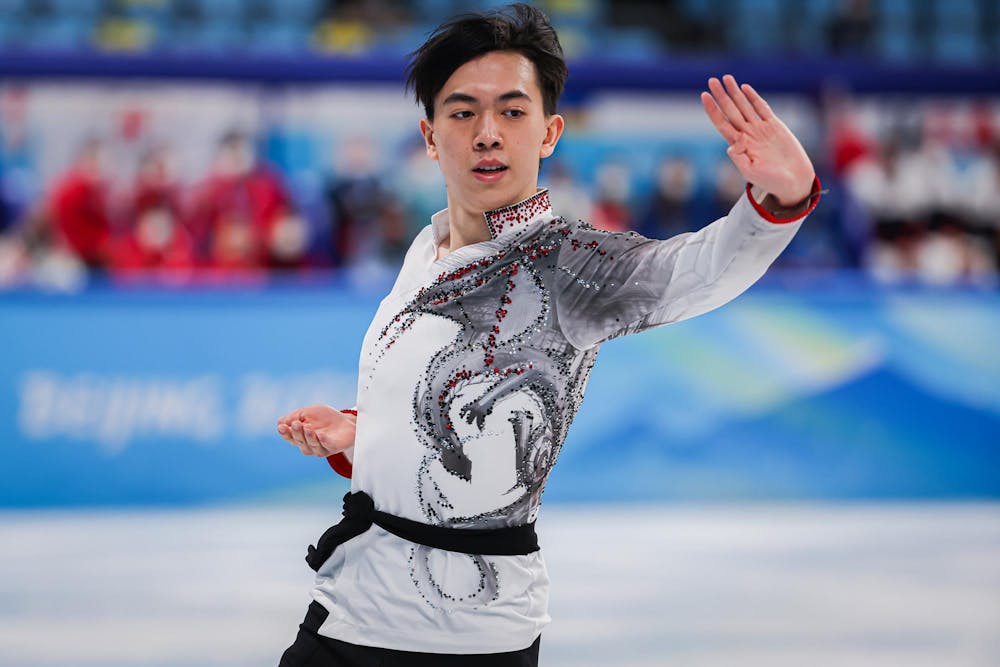In a much-anticipated announcement, the International Skating Union declared the U.S. Figure Skating Team champions in late January for their performance at the 2022 Olympics.
Among these athletes is Vincent Zhou ’26, who made history in 2018 as the first skater to land a quadruple lutz in the Olympic games. His accomplishments have since grown to encompass two World Championship medals, a Grand Prix win, two stints at the Olympics and now Olympic gold.
“It’s been a huge weight off our shoulders,” Zhou said in an interview with The Herald. “We’re all really happy and we’re glad that things worked out the way they did.”
But amid the celebration, Zhou stressed that the fight for clean sport is far from over.
The ISU announcement came almost two years after the 2022 Winter Olympics, after the Court of Arbitration for Sport — an international sports arbitration body — imposed a four-year disqualification on Russian skater Kamila Valieva for violating anti-doping rules. Valieva’s positive doping result, which emerged after Russia won a gold medal in the team event, resulted in the indefinite postponement of the medal ceremony for the first time in Olympic history. The American team and the Japanese team — which placed second — have yet to receive their medals.
Alongside his team members, Zhou has become a vocal advocate for clean sport in the competition’s aftermath. In an open letter published last September, Zhou criticized skating and sport organizations for their lack of transparency and communication.
Court proceedings were confidential, even for impacted athletes. “You’d think that as a party directly involved in the case, we would be able to … have a seat as an observer,” he said. “But we were not granted that seat … We knew as much as people on the internet knew.”
The prolonged decision stemmed from a multitude of factors. Chief among them was Valieva’s “protected persons” status as a minor under the age of 16, which stipulates some leniency in imposing sanctions in certain cases.
Some organizations, including the World Anti-Doping Agency, have faced backlash for alleged leniency with Valieva’s punishment. “When the news broke, people weren’t really surprised,” Zhou said, referencing Russia’s history of doping violations.
Valieva hails from the Tutberidze skating camp, which has long faced scrutiny for its extreme intensity. “They’ve got (so many young) girls doing things the strongest men in the world would struggle to do,” said Zhou. “It’s hard to ignore that that is a really suspicious pattern.” Valieva’s entourage has not faced legal repercussions amid the scandal.
“It’s hard to consider this gold medal as an absolute win,” Zhou said. “I’m lucky that this case got the publicity and the legal procedure it did … Just think of every single (past) competition with unchecked cases of doping. Those clean athletes will never get their medals because those cases will never see the light of day.”
“It’s not (just) about Team USA … It’s about every other athlete in the world who cares even a little bit about fair competition and clean sport, because everybody is affected when there are people doping in the field,” Zhou added.
He extended his sympathies to other skaters at the Olympics, including Team Canada, who missed out on bronze during the medal reallocations in favor of the Russian Olympic Committee.
The Olympic scandal has since kindled conversations around the rules in the sport, including a move to increase the age limit for senior figure skating competitions. But Zhou believes that the fight for clean sport begins with athletes’ voices.
The World Anti-Doping Agency “exists to protect the interests of clean athletes and to root out athletes who don’t have clean sports in their interest,” Zhou said. “I hope that the opinions of athletes begin to be taken more seriously, and I hope that our voices are given more weight and space.”
Zhou took a step back from his skating career after the 2021-22 season and currently concentrates in economics. Like many Brown students, he is also “on that p-set grind.”
But Zhou maintains “high hopes” for the future of the sport. “There are so many amazing, clean athletes around the world right now that are extremely exciting to watch,” he said. “I’ve got more to give to the sport … I hope to (contribute) my entire life to this amazing community.”
Megan is a metro editor covering health and environment. Born and raised in Hong Kong, she spends her free time drinking coffee and wishing she was Meg Ryan in a Nora Ephron movie.





